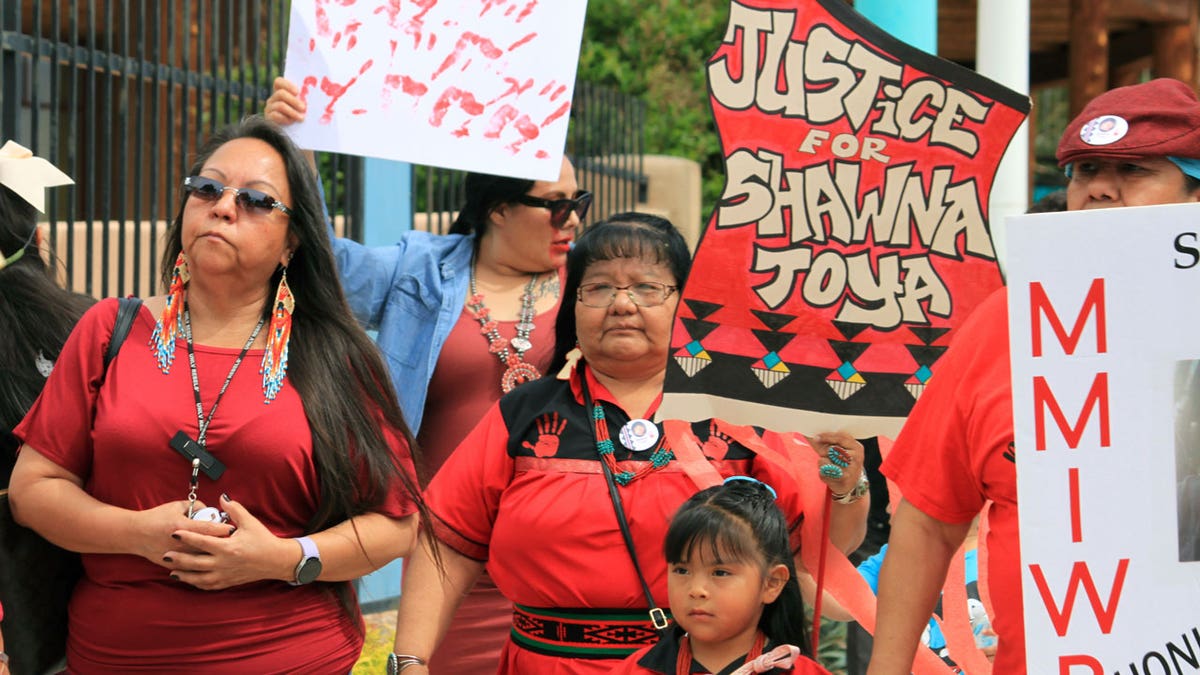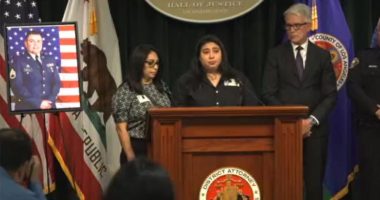It was a frigid winter morning when authorities found a Native American man dead on a remote gravel road in western New Mexico. He was lying on his side, with only one sock on, his clothes gone and his shoes tossed in the snow.
There were trails of blood on both sides of his body and it appeared he had been struck in the head.
Investigators retraced the man’s steps, gathering security camera footage that showed him walking near a convenience store miles away in Gallup, an economic hub in an otherwise rural area bordered on one side by the Navajo Nation and Zuni Pueblo on the other.
TRIBES BLAST SOUTH DAKOTA GOVERNOR’S CLAIM THAT LEADERS ARE BENEFITTING FROM DRUG CARTELS
Court records said the footage and cell phone records showed the victim — a Navajo man identified only as John Doe — was “on a collision course” with the man who would ultimately be accused of killing him.
A grand jury has indicted a man from Zuni Pueblo on a charge of second-degree murder in the Jan. 18 death, and prosecutors say more charges are likely as he is the prime suspect in a series of crimes targeting Native American men in Gallup, Zuni and Albuquerque. Investigators found several wallets, cell phones and clothing belonging to other men when searching his vehicle and two residences.
As people gathered around the nation on Sunday to spotlight the troubling number of disappearances and killings in Indian Country, authorities say the New Mexico case represents the kind of work the U.S. Department of Justice had aspired to when establishing its Missing and Murdered Indigenous Persons outreach program last summer.

Geraldine Toya, center, marches to bring awareness to the death of her daughter, Shawna Toya, in 2021, as dozens of people participate in Missing and Murdered Indigenous Persons Awareness Day in Albuquerque, New Mexico, on May 5, 2024. (AP Photo/Susan Montoya Bryan)
Special teams of assistant U.S. attorneys and coordinators have been tasked with focusing on MMIP cases. Their goal: Improve communication and coordination across federal, tribal, state and local jurisdictions in hopes of bridging the gaps that have made solving violent crimes in Indian Country a generational challenge.
Some of the new federal prosecutors were participating in MMIP Awareness Day events. From the Arizona state capitol to a cultural center in Albuquerque and the Qualla Boundary in North Carolina, marches, symposiums, art exhibitions and candlelight vigils were planned for May 5, which is the birthday of Hanna Harris, who was only 21 when she was killed on the Northern Cheyenne Indian Reservation in Montana in 2013.
It was an emotional day in Albuquerque, where family members and advocates participated in a prayer walk. They chanted: “What do we want? Answers! What do we want? Justice!” There were tears and long embraces as they shared their stories and frustrations. They talked about feeling forgotten and the lack of resources in Native communities.
Geraldine Toya of Jemez Pueblo marched with other family members to bring awareness to the death of her daughter Shawna Toya in 2021. She said she and her husband are artists who make pottery and never dreamed they would end up being investigators in an effort to determine what happened to their daughter.
“Our journey has been rough, but you know what, we’re going to make this journey successful for all of our people that are here in this same thing that we’re struggling through right now,” she said, vowing to support other families through their heartbreak as they seek justice.
Alex Uballez, the U.S. attorney for the District of New Mexico, told The Associated Press on Friday that the outreach program is starting to pay dividends.
“Providing those bridges between those agencies is critical to seeing the patterns that affect all of our communities,” Uballez said. “None of our borders that we have drawn prevents the spillover of impacts on communities — across tribal communities, across states, across the nation, across international borders.”
Assistant U.S. Attorney Eliot Neal oversees MMIP cases for a region spanning New Mexico, Arizona, Colorado, Utah and Nevada.
Having law enforcement agencies and attorneys talking to each other can help head off other crimes that are often precursors to deadly violence. The other pieces of the puzzle are building relationships with Native American communities and making the justice system more accessible to the public, Neal said.
Part of Neal’s work includes reviewing old cases: time-consuming work that can involve tracking down witnesses and resubmitting evidence for testing.
“We’re trying to flip that script a little bit and give those cases the time and attention they deserve,” he said, adding that communicating with family members about the process is a critical component for the MMIP attorneys and coordinators.
The DOJ over the past year also has awarded $268 million in grants to tribal justice systems for handling child abuse cases, combating domestic and sexual violence and bolstering victim services.
Assistant U.S. Attorney Bree Black Horse was dressed in red as she was sworn in Thursday during a ceremony in Yakima, Washington. The color is synonymous with raising awareness about the disproportionate number of Indigenous people who have been victims of violence.
She prosecutes MMIP cases in a five-state region across California and the Pacific Northwest to Montana. Her caseload is in the double digits, and she’s working with advocacy groups to identify more unresolved cases and open lines of communication with law enforcement.
An enrolled member of the Seminole Nation of Oklahoma and a lawyer for more than a decade, Black Horse said having 10 assistant U.S. attorneys and coordinators focusing solely on MMIP cases is unprecedented.
“This is an issue that has touched not only my community but my friends and my family,” she said. “I see this as a way to help make sure that our future generations, our young people don’t experience these same kinds of disparities and this same kind of trauma.”
In New Mexico, Uballez acknowledged the federal government moves slowly and credited tribal communities with raising their voices, consistently showing up to protest and putting pressure on politicians to improve public safety in tribal communities.
Still, he and Neal said it will take a paradigm shift to undo the public perception that nothing is being done.
CLICK HERE TO GET THE FOX NEWS APP
The man charged in the New Mexico case, Labar Tsethlikai, appeared in court Wednesday and pleaded not guilty while standing shackled next to his public defender. A victim advocate from Uballez’s office was there, too, sitting with victims’ family members.
Tsethlikai’s attorney argued that evidence had yet to be presented tying her client to the alleged crimes spelled out in court documents. Assistant U.S. Attorney Matthew McGinley argued that no conditions of release would keep the community safe, pointing to cell phone data and DNA evidence allegedly showing Tsethlikai had preyed on people who were homeless or in need of alcohol so he could satisfy his sexual desires.
Tsethlikai will remain in custody pending trial as authorities continue to investigate. Court documents list at least 10 other victims along with five newly identified potential victims. McGinley said prosecutors wanted to focus on a few of the cases “to get him off the street” and prevent more violence.









